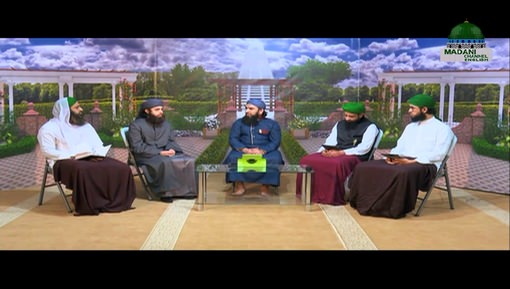Time Management
The Essence of Time
Maulana Muhammad Asif Iqbal Attari Madani
What is Time?
Time is a significant bounty of Allah Almighty. Time is divided in many ways. Sometimes we express time in the form of hours and days. Sometimes we call it ‘day and night’ and sometimes ‘morning and evening’. At times we refer to it as the past, present and future and other times we use the words “today” and “yesterday.” The subject of time has been addressed in the Quran. Allah Almighty states:
وَ مِنْ اٰیٰتِهِ الَّیْلُ وَ النَّهَارُ وَ الشَّمْسُ وَ الْقَمَرُؕ-
“And amongst His signs are the night, and the day, and the sun, and the moon.”[1]
The passing of time consists of two things, the day and night. Sayyidunā ʿĪsā عَـلَيْـهِ الـسَّـلاَم said:
اِنَّ ھٰذَا اللَّیْلَ وَالنَّھَارَ خَزَانَتَانِ فَانْظُرُوْا مَا تَصْنَعُوْنَ فِیْھِمَا
“The day and night are treasures. Think carefully how you utilise them.”[2]
The value of time in the Quran
Allah Almighty decalares:
وَ الْعَصْرِۙ(۱) اِنَّ الْاِنْسَانَ لَفِیْ خُسْرٍۙ(۲) اِلَّا الَّذِیْنَ اٰمَنُوْا وَ عَمِلُوا الصّٰلِحٰتِ وَ تَوَاصَوْا بِالْحَقِّ ﳔ وَ تَوَاصَوْا بِالصَّبْرِ۠(۳)
“By the oath of that era of the Beloved (Prophet Muhammad). Indeed, mankind is surely in loss. Except those who believed and did good deeds, and advised one another towards the truth, and advised one another to have patience.”[3]
The “loss” of mankind is that life, which is their most valuable asset, is continuously deteriorating. Therefore, they should use their time for virtuous acts and for the benefit of others. One of the righteous servants of Allah Almighty said:
I understood the meaning of Surah al-ʿAṣr from a vendor selling ice in the market. He would announce, “Have mercy on the one whose asset (the ice) is melting away.” Hearing his cries, I remarked, “This is the meaning of ‘Indeed, mankind is surely in loss.’ The life given to us is passing by quickly like the melting ice. If it is wasted on misdeeds, then you will only reap loss.”[4]
The Value of Time in Hadith
Life is but a brief episode—a truth no-one will contest. We owe it to be grateful for the precious moments that we have, while realising that they will end sooner or later. After all, death could arrive at any moment. The one who valued time the most, the Prophet صَلَّى الـلّٰـهُ عَلَيْهِ وَاٰلِهٖ وَسَلَّم said:
اِغْتَنِمْ خَمْساً قَبْلَ خَمْسٍ: شَبَابَکَ قَبْلَ ہَرَمِکَ وَصِحَّتَکَ قَبْلَ سَقَمِکَ وَغِنَاکَ قَبْلَ فَقْرِکَ وَفَرَاغَکَ قَبْلَ شُغْلِکَ وَحَیَاتَکَ قَبْلَ مَوْتِکَ
“Take advantage of five before five:[5] Youth before old age; health before illness; wealth before poverty; free time before busyness; and life before death.”
The Prophet صَلَّى الـلّٰـهُ عَلَيْهِ وَاٰلِهٖ وَسَلَّم also said:
مَا مِنْ یَوْمٍ طَلَعَتْ شَمْسُہُ فِیْہِ اِلَّا یَقُوْلُ مَنِ اسْتَطَاعَ اَنْ یَّعْمَلَ فِیَّ خَیْرًا فَلْیَعْمَلْہُ فَاِنِّیْ غَیْرُ مُکَرَّرٍ عَلَیْکُمْ اَبَدًا
“Every day, when the sun rises, it announces: ‘Whoever is capable of performing good in me (today) should do so, because I will never return to you.’”[6]
Pious Predecessors and Time
These righteous servants of Allah Almighty knew and taught people about the value of time. They were blessed souls who benefitted others and joined the ranks of:
خَیْرُالنَّاسِ مَنْ یَّنْفَعُ النَّاسَ
“The best of you are those who benefit others.”[7]
Sayyidunā Abū Dardāʾ رَضِىَ الـلّٰـهُ عَـنْهُ said:
یَا اِبْنَ آدَمَ اِنَّمَا اَنْتَ اَیَّامٌ فَکُلَّمَا ذَھَبَ یَوْمٌ ذَھَبَ بَعْضُکَ
“Dear people! You are nothing but the sum of a few days. When a day passes, a part of you vanishes ˹forever˺.”[8]
Someone said to Sayyidunā ʿUmar ibn ʿAbd al-ʿAzīz رَحْمَةُ الـلّٰـهِ عَـلَيْـه, “O leader of the believers, you can do this tomorrow.” He replied, “I struggle to complete my daily work. If I leave today’s work for tomorrow, how will I complete the work of two days in one day?”[9]
May Allah Almighty grant us the ability to understand the significance of time and to spend it in performing good actions.
اٰمِیْن بِجَاہِ النَّبِیِّ الْاَمِیْن صَلَّی اللہ تَعَالٰی عَلَیْہِ وَاٰلہٖ وَسَلَّم
[1] [Kanz-ul-Iman (translation of Quran)] (Part 24, Surah Ha-Meem Al-Sajdah, verse 37)
[2] Tareekh Ibn Asakir, vol. 47, p. 435
[3] [Kanz-ul-Iman (translation of Quran)] (Part 30, Surah Al-‘Asr, verses 1 - 3)
[4] Tafseer Kabeer, vol. 11, p. 278
[5] Mustadrak, vol. 5, p. 435, Hadith 7916
[6] Shu’ab al-Iman, vol. 3, p. 386, Hadith 3840
[7] Kanz ul ‘Ummaal, vol. 16, p. 54, Hadith 44147
[8] Shu’ab al-Iman, vol. 7, p. 381, Raqm 10663
[9] Seerat Wa Manaqib Umar Bin Abd al-’Aziz, al-Ma’roof Seerat Ibn Jauzi, p. 225











Comments